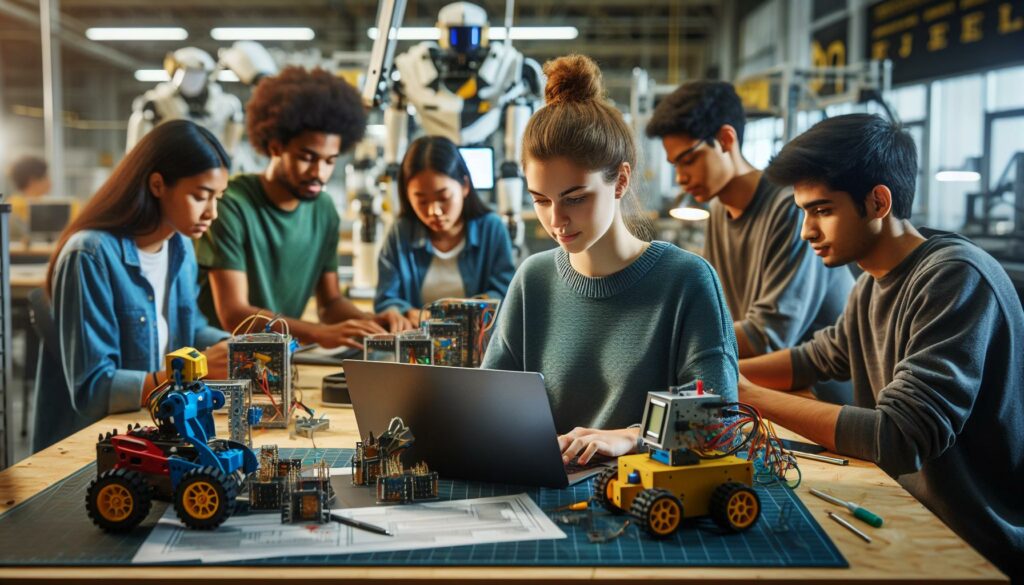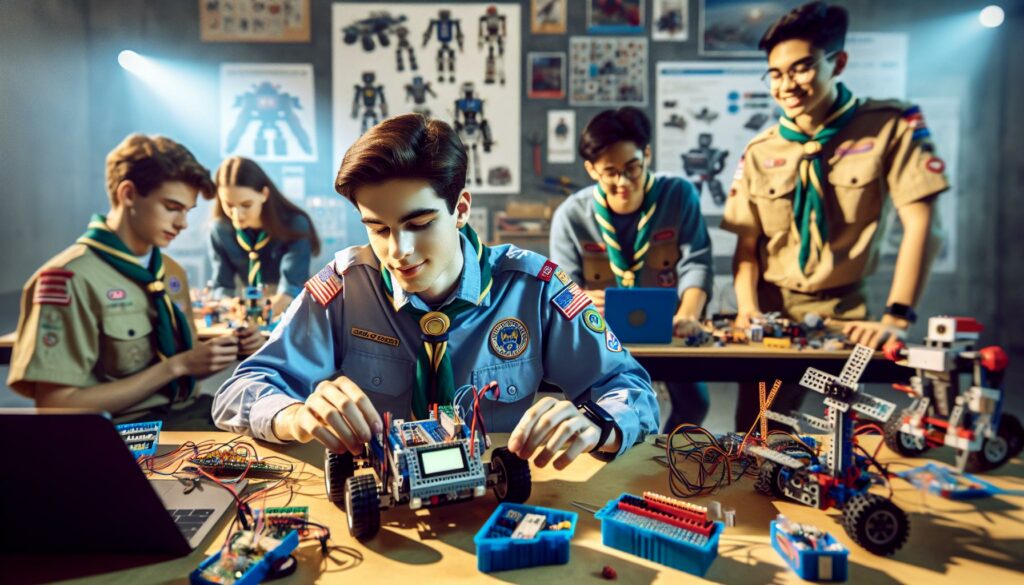Purdue University has become a powerhouse in the field of robotics, blending cutting-edge research with innovative applications. As I dive into the world of Purdue robotics, I’m constantly amazed by the groundbreaking projects and initiatives that are shaping the future of technology. From autonomous vehicles to advanced manufacturing systems, the possibilities seem endless.
The university’s commitment to fostering collaboration between students, faculty, and industry leaders creates an environment ripe for innovation. It’s inspiring to see how Purdue’s robotics programs not only push the boundaries of what’s possible but also prepare the next generation of engineers and researchers. Join me as I explore the fascinating developments and the impact of Purdue robotics on our world.
Key Takeaways
- Purdue’s Robotics Leadership: Purdue University is recognized as a leader in robotics, featuring a collaborative approach that integrates various disciplines such as engineering and computer science.
- Diverse Research Areas: The university focuses on several key research areas, including autonomous systems and human-robot interaction, which enable innovative solutions for real-world challenges.
- Practical Applications: Purdue Robotics emphasizes real-world applications through partnerships with industry leaders, enabling students to gain hands-on experience while addressing practical problems in fields like transportation and agriculture.
- Historical Milestones: Significant developments, such as the founding of the robotics program in the 1980s and the establishment of specialized research centers, have positioned Purdue as a key player in robotics research and education.
- Innovative Educational Opportunities: Both undergraduate and graduate programs offer extensive training in robotics, encouraging students to engage in hands-on learning and cutting-edge research.
- Impactful Projects: Notable initiatives include advancements in autonomous vehicles, robotic perception, and humanoid robotics, showcasing Purdue’s commitment to pushing the boundaries of technology in robotics.
Purdue Robotics
Purdue Robotics integrates diverse disciplines, enhancing research and educational opportunities. The program focuses on developing cutting-edge technologies, including autonomous navigation systems, robotic perception, and manipulation. Collaboration among departments, such as engineering and computer science, ensures a holistic approach to problem-solving.
Key robotics initiatives at Purdue include:
- Autonomous Vehicles: Research on self-driving cars emphasizes safety, efficiency, and real-world applications.
- Robotic Manufacturing: Advanced manufacturing systems improve production efficiency and reduce human intervention.
- Humanoid Robotics: Projects explore human-robot interaction, programming, and the development of versatile machines.
Purdue’s robotics programs are supported by state-of-the-art facilities and resources. The university’s partnership with industry leaders provides students hands-on experience, bridging the gap between theory and practice. Student-led organizations and competitions enhance learning, encouraging innovation and teamwork.
Research centers like the Purdue Autonomous Vehicle Laboratory highlight the commitment to addressing real-world challenges. This environment nurtures creativity, enabling students to contribute to groundbreaking advancements in robotics technology.
Historical Background
Purdue University’s robotics program boasts a rich history marked by significant developments and contributions to the field. By fostering a collaborative atmosphere, Purdue has become a leader in robotics education and innovation.
Key Milestones
- Founding of the Robotics Program (1980s): Purdue established its robotics research initiatives during the 1980s, focusing on automation and control systems.
- Introduction of Autonomous Systems (1999): The university launched major projects emphasizing autonomous systems, enhancing research in areas like mobile robotics and sensor integration.
- Creation of the Purdue Robotics Accelerator (2015): This accelerator supports startups and entrepreneurs, nurturing innovative robotics ventures and fostering industry partnerships.
- Establishment of Research Centers (2020): The formation of specialized research centers, such as the Purdue Autonomous Vehicle Laboratory, strengthens Purdue’s commitment to advancing autonomous technologies.
- Involvement in National Competitions: Purdue consistently participates in national robotics competitions, showcasing student talent and innovation in addressing real-world challenges.
- Innovative Research: Purdue has contributed to various research projects that push the boundaries of robotics, including work on robotic perception and manipulation technologies.
- Education and Training: The university’s programs equip students with hands-on experience, preparing the next generation of engineers to tackle complex problems.
- Industry Collaboration: Partnerships with leading companies enable the integration of academic research and practical applications, driving forward robotics advancements.
- Publications and Patents: Purdue researchers publish extensively in top journals, sharing findings that influence the global robotics community, contributing to new patents and technological breakthroughs.
- Interdisciplinary Approaches: By blending expertise from engineering, computer science, and other fields, Purdue’s robotics programs foster diverse solutions to emerging robotics challenges.
Through these milestones and contributions, Purdue University continues to shape the future of robotics technology and innovation.
Research Areas
Purdue Robotics encompasses several impactful research areas that drive innovation and applicability in the robotics field. Two notable focuses include autonomous systems and human-robot interaction.
Autonomous Systems
Purdue’s research on autonomous systems emphasizes the development of technologies that enhance safety and efficiency in transportation. I explore advances in self-driving cars, which integrate sophisticated algorithms for navigation and decision-making. This initiative promotes safer roadways by reducing human error. Projects also investigate drone technology for applications like agricultural monitoring and disaster response, showcasing versatility across various sectors. Engineers at Purdue utilize state-of-the-art simulation environments to rigorously test autonomous systems, ensuring reliability in real-world scenarios.
Human-Robot Interaction
Human-robot interaction research at Purdue investigates the relationship between humans and robotic systems. I find that understanding these dynamics is crucial for designing intuitive interfaces that facilitate seamless collaboration. Projects often involve humanoid robots, which serve as social companions or assistants in healthcare settings. I engage in studies that assess user responses to robotic presence, aiming to enhance trust and cooperation. Additionally, interdisciplinary collaborations explore ethical implications, addressing concerns about privacy and decision-making in automated systems, thereby leading to more responsible robotic applications.
Notable Projects
Purdue Robotics showcases various innovative projects that push the boundaries of technology. The initiatives reflect a commitment to enhancing both research and practical applications.
Purdue Robotics Lab Initiatives
Purdue Robotics Lab engages in several groundbreaking initiatives. The development of autonomous vehicles emphasizes safety, incorporating advanced sensing technologies and AI algorithms to navigate complex environments. Projects on robotic perception focus on enabling machines to recognize and interpret surroundings effectively, facilitating safer interactions. Additionally, initiatives in robotic manipulation enhance systems’ ability to perform delicate tasks, such as surgical operations or assembly line procedures, with precision.
Collaborations With Industry
Purdue Robotics collaborates extensively with industry partners. Partnerships with technology companies foster practical applications of research, allowing students to work on real-world problems. Joint projects on advanced manufacturing systems streamline production processes while reducing costs and increasing efficiency. Collaborations in the agricultural sector explore drone technology for crop monitoring and management, aiming to optimize resource allocation. These relationships ensure that students gain valuable experience, bridging the gap between academia and industry while addressing emerging challenges in robotics.
Educational Opportunities
Purdue Robotics offers a range of educational opportunities that equip students with essential skills and knowledge in the rapidly evolving field of robotics. These programs emphasize hands-on learning and research, allowing students to engage with cutting-edge technology.
Undergraduate Programs
Purdue’s undergraduate programs in robotics provide students with a comprehensive understanding of engineering principles. Students pursue degrees in areas such as Mechanical Engineering, Electrical Engineering, and Computer Science, integrating robotics into their coursework and projects. They participate in hands-on labs and collaborative projects, such as the Design and Build course, where teams create functional robotic systems. The interdisciplinary curriculum encourages innovation, enabling students to specialize in areas like automated systems or robotics programming. Student organizations, including the Purdue Robotics Club, enhance learning through competitions and projects that foster teamwork and real-world experience.
Graduate Research Opportunities
Graduate research opportunities at Purdue focus on advanced topics in robotics, including autonomous systems, robotic perception, and human-robot interaction. Master’s and PhD students engage in cutting-edge research projects, often collaborating with faculty in specialized centers such as the Purdue Autonomous Vehicle Laboratory. Research initiatives involve developing algorithms for navigation and control of autonomous vehicles, enhancing robotic interactions through AI, and exploring ethical considerations in robotics deployment. Graduate students benefit from access to state-of-the-art facilities, industry partnerships, and funding for research projects, ensuring they contribute effectively to advancements in robotics technology.
Forefront of Innovation
Purdue Robotics stands at the forefront of innovation and education in the robotics field. The blend of cutting-edge research and practical applications truly excites me. It’s inspiring to see how the university nurtures creativity and collaboration among students and faculty.
The commitment to developing technologies that tackle real-world challenges is impressive. Whether it’s autonomous vehicles or advanced manufacturing systems, Purdue’s initiatives are shaping the future.
I’m eager to see how this dynamic program continues to evolve and influence the global robotics community. With its focus on interdisciplinary learning and industry partnerships, Purdue is undoubtedly preparing the next generation of leaders in robotics.



